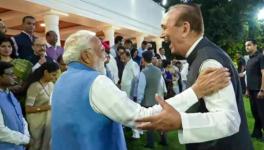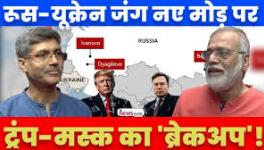Yesterday’s Men
Global Chaos | Image courtesy: Deviant Art
L’appel du vide: the call of the void. It’s the tug you feel when you peer over the edge of a cliff and the sheer drop looks compelling. The rocks, way down, hold your gaze with a hypnotic answering stare. They grin in the sunset glow. Behind you, life has turned opaque and hostile like a sentence without reprieve. Also the kind of sentence that teems with adjuncts and commas, new truths from a fast-changing world: the climate crisis, the extinction of species, worsening inequality, income insecurity, shrinking rights, foul air, the din of hate… As you lose yourself in the smile of the rocks below, Splat! can seem as good a full-stop as any.
It is l’appel du vide time, globally. Close to eight billion of us crouch at the edge of the cliff, transfixed by the rocks, their crooked-toothed smile. They look like eternal truths holding firm in a volatile world. We are reluctant to turn around and face life. Tomorrow looks set to be bleak. Far easier to linger here, posting selfies to kill time before darkness falls.
Our mood and situation feel new, but they are not. If we swapped our social media platforms for a chessboard, we’d fit right in beside Mirza Sajjad Ali and Mir Raushan Ali from Premchand’s 1924 story, “The Chess Players”. Waiting uneasily for the future to arrive, keeping our spirits up with deft moves and counter-moves in a virtual world, unable to influence happenings in the real one. Too inert to act, set in our ways, alone and frightened, we turn on one another, our passion and eloquence reserved for safe spaces.
The game of chess was once the mark of aristocrats. It stood for the virtues of having a vantage point, the ability to act boldly and take the long view; but in Premchand’s story the players have shrunk to the dimensions of their board and its frozen pieces. They are pawns about to be captured by history.
In our times, the degradation of the Internet is a comparable phenomenon. Till recently, the Net stood for the virtues of the age: a guarantor of robust citizenship. But the digital simulacrum of the world has veered off-track from its hopeful start. We may imagine we are all on the front-line as we post and comment busily, but a truthful post is no match for boots on the ground, the doctoring of laws, or large flows of lies and money. We have become the patsies of a global surveillance regime, giving away our personal data with both hands to a state that grows increasingly opaque. It is an awkward truth to admit and live with, for where would we exist if not on the Internet?It is three centuries since the global polity became a working concept. Of these, the last two also had a shaky start, with the whole world bewildered and on edge. In the early nineteenth century, the Napoleonic Wars put the wind up both monarchs and republicans. Was this the future, they wondered, this kitsch rehash. An upstart emperor who behaved like he was heir to the Enlightenment and the French Revolution, who swaggered around Europe on his tubby legs—starting wars, looting the continent, redrawing maps, secularising the law—a barbarian on a civilising mission. Napoleon’s challenge was quashed but the upset he caused did not subside till halfway into the century. Not till millions of violent deaths later.The start of the twentieth century was similar, a darkening decade-and-a-half inaugurated by the newspaper-provoked Spanish-American War (1898) and the newspaper-stoked Anglo-Boer war (1899–1902). Newspapers, their owners, and readers were a new political force at the time, learning their strength as they tried it. They were meant to be agents of transparency and democratic participation, or weren’t they? Part of a virtuous cycle, surely, of widening literacy, of social movements that led to the abolition of slavery, to the suffragettes, the workers’ cause, an informed citizenry that spoke in many voices and believed in Progress. Until, quite suddenly, the newspapers and their public stopped doing that. Nationalism and testosterone overran pages and minds alike. A band of powerful old men—newspaper magnates, politicians, arms manufacturers, tycoons of finance—dispatched two generations of the young to war, while civilians did grinding work on meagre rations, endured bombing raids at night and died in greater numbers than did soldiers on the front. Among historians of the period there is a view that the Great War did not end till 1945, that the Second World War was simply the first one fought to conclusion.
Also Read: Learning from Anand Teltumbde by Salim Yusufji
Here we are now, and here is a new century in its awkward years, discredited ideas again to the fore: nationalism, religion, racism, patriarchy. These ideas are incapable of detailing a better future; their knowledge and values were superseded long ago. But their power comes from make-believe. The collective delusion of our time is that these ideas are eternal truths, old as the rocks, and will secure us from the future. If we grip them tight like talismans, the Real may never arrive. Or pass unnoticed when it does. For, we shall be in a state of grace by then: in Ram Rajya. Or an America made great again. In the eternal Russia, a resurgent Britain, Turkey made whole, Israel complete, Brazil firing on all cylinders, China back in world dominance.
Every tribe forms a circle of complicity around its dream. Each national fantasy runs on the pretence that the nation state’s destiny is a thing apart from the destiny of the world. National solipsism shuts out cross-questioning and empirical detail, declares a taboo on them.
Among the unremarked signs of our time is the rate of attrition among global women leaders. Yingluck Shinawatra, Park Geun-hye, Dilma Rousseff, Cristina Fernandéz de Kirchner: all probed and indicted for corruption. They went down in quick succession, in a period that also saw “Crooked Hillary” fall and a ferocious campaign against Christine Lagarde. Considering how few women ever reach this prominence, it looks like a systematic depletion.
Male leaders who flourish in this climate include such models of probity as Vladimir Putin, Recep Tayyip Erdoğan, Benjamin Netanyahu, Viktor Orbán, Narendra Modi, Xi Jinping, Donald Trump, Rodrigo Duterte, Jair Bolsonaro, Boris Johnson. Let us not get into their views on feminism, treatment of women, or their histories with women. We’d be here all day. What put paid to the careers of so many top-level women leaders has nothing to do with their corruption and everything to do with the present global blight threatening women, minorities and the poor. Women leaders, like climate refugees, are a sign of the future, a common future, while we are sworn to defending the values of an exclusionary past.
Let us return to these men—the face of the blight. The family resemblance among them runs bone-deep. They were thought up in the late 1880s by a band of unruly schoolboys in Rennes, France. In this gang was Alfred Jarry, the future playwright and novelist. Taught physics at school by one Monsieur Hébert, a portly man of absolute self-confidence and rank incompetence, the pupils found joy turning him into a caricature. Père Ebè (Daddy Heb), as they styled him, is a specialist in something above and beyond mere physics. He stands at the epi of the meta of physics, which is the domain of pataphysics. What is this pataphysics? It is the “science of imaginary solutions”, the “science that governs exceptions to the rule”.
A mastery of pataphysics means never having to admit you are wrong or still have learning to do. You have the authority to cook up facts in support of your authority. Why should a man of such transcending power limit himself to a provincial career? And so, Alfred Jarry and his friend Henri Morin staged a play about Daddy Heb’s adventures among the Poles, transporting their protagonist to the international arena.
Daddy Heb remained with Jarry in later years, turning ever more bizarre and grotesque on the page. In 1896, the twenty-three-year-old Jarry staged Ubu Roi (King Ubu) in Paris, a play about an overweight despot who usurps the throne of Poland. Ubu is a man of monstrous appetites and stupidity, driven solely towards self-gratification. Abominable as he is, Ubu does get one thing right: there’s a part of everyone that corresponds to his greed and selfishness. People can be bought—crowds with a fistful of coins they will happily fight over, officials with promises of sacks of gold. And he is on a roll. He fancies himself a “Master of Phynances”, but he will never be the phynancial tide that lifts all boats; his own enrichment is all he is after. “With this system,” he says, “I’ll have quickly made a fortune, then I’ll kill everyone and I’m out of here.”
Like any monster of selfishness, Ubu mistakes others for feebler versions of himself. He cannot imagine another seat of consciousness, other priorities than his own. What others say does not register with him. The result is that he is locked into himself and cannot develop. He’s a prime mover who can only repeat his doings endlessly, and does so across the length of four plays (the fourth one a reworking of Ubu Roi, with songs). For many in Jarry’s Paris audience, the first exposure was exhausting enough. The outlandishness of this character, his obscenity and flat-out pointlessness, riled them from the opening word: Merdre! (Usually translated to a weak “Pschitt!” or “Shittrrr!” Hindi conveys its full flavour: Tattri!)
Jarry’s parody of statecraft looks spot-on today, in the age of Donubu, Johnubu, Namobu and others. To set them in a Venn diagram may be illuminating, with all these men ranged around Ubu. It would show their common centre—the extraordinary cruelty, wilful ignorance, habit of lying, corrosion of state institutions, attacks on media and free expression, reliance on military, enactment of repressive laws, megalomania, physical vanity and masculine insecurities; along with those little differences that make each one special. But it might get too personality-oriented and suppress the real story. The wonder is not that they share so many traits but how such traits became a winning combination.
Rana Dasgupta’s 2018 essay, “The Demise of the Nation State”, points out that the globe-wide resurgence of nationalism is a smokescreen to disguise the fact that national governments have lost purpose and authority. They are glorified bed-and-breakfast joints for global finance as it travels from investment to offshore account. They wait, cap in hand, to learn their ratings as “investment destination”, cosset clients with free add-ons, and, having lost control over capital, increasingly lack the vision, morale or wherewithal to do much for their citizens. The government’s withdrawal from employment, welfare and all public-interest policy-making—from the environment to labour rights—is stark. What is left for governments to do? How may they look vital and relevant? They can exaggerate external and internal threats, move these to the centre of popular discourse, organise and referee cockfights between sub-national groups, get into pissing contests with a neighbouring state, turn something as ordinary as citizenship into a rare prize (and isolate the weakest, poorest people in the country), fight with the past, with facts—the catalogue is mostly to do with fighting—and turn all this into a formula for electoral engineering. It’s a small bag of tricks but they are a proven success and may be repeated endlessly, on a loop.
Also Read: The Presence of the Other: Religion and Society in Early North India by Romila Thapar
Masha Gessen’s The Future is History (2017) notes the rise of a new class of fixers in post-Soviet Russia: the political technologists. They work as marketing agents for would-be leaders. They target voters, manipulate public attention, establish new talking points, hard sell clients, disrupt the news cycle with planted stories, groom politicians in the aesthetics of self-presentation, school them in self-promotion. Facts, figures and ideology are secondary. The aim is to suck up all the oxygen in the room and command the narrative. The political leader is a product to be marketed, a collage of shiny bits assembled along the principle of their appeal to various groups.
What do you think Modi will be when the next big election rolls around? He will need voters to feel insulted on his behalf, this is a given. Gujarati self-respect suffered the first blow, then the dignity of the chaiwala, then the integrity of the chowkidar. Worked like a charm each time. It is so practised by now that the cast and crew of the chowkidar routine dropped it matter-of-factly, directly after elections.
Between elections, Modi collects accolades on our behalf and sets us chasing our own tails. It looks like a new game each time, but only the name of the quarry is different: the Macaulay putras (as were) morph into urban naxals and the tukdé-tukdé gang; the beef-lovers are the miyas, the love jehadis, the Kashmiris. The outrage against them is simulated, but the malice isn’t—it is licensed. Why would a public complicit in this farrago hold the leader to account for his other fictions? Why should he not continue living in a bubble of self-importance, undisturbed by facts, hungering for more recognition?
Ettore Scola released his film Una Giornata Particolare (A Special Day) in 1977. Starring Sophia Loren and Marcello Mastroianni, its story takes place on 4 May 1938, as Hitler and Mussolini tour Rome together to the acclaim of crowds. Loren and Mastroianni form the still, tense centre of a pulsing city. Both are useful props to the new order—as its rejects. She is a housewife who must stay home and support her husband and children, small-time fascists who are off to the rally. He is gay and a communist, a hunted man. Their lives come together fleetingly in their deserted apartment block with the city streets and its radio sets shrilling from all sides, but the film’s real drama takes place among the audience, as a silent moment of reckoning.
In 1977, there would have been people with memories of that very day, now remembering their dead loved ones and wondering at the foolishness that had beset their country. How were so many taken in by a pair of warmongering buffoons and their tawdry parade? Young people in the cinema halls would have been aghast, too. Here they were, in the future, looking back at yesterday’s men. How did Hitler and Mussolini ever look like an answer? And to what question?
They were looking back from the security of the late-seventies, with a different global order and new priorities. A rights-based polity was spreading around the globe. From twelve democracies worldwide in 1945, there would be eighty-seven by 2000. Two of humankind’s greatest achievements were notched in quick succession: the adoption of The Universal Declaration of Human Rights and the eradication of smallpox (its last known case reported in the year of Scola’s film). The earth was not heaven and was never going to be, but universal betterment meant something: universal franchise, rights, participation, freedoms, and solutions. Not at all the same thing as being wrapped up in a leader’s personal glories and humiliations.
Salim Yusufji recently co-edited Battling for India: A Citizen's Reader with Githa Hariharan and is currently translating Gyan Chaturvedi's novel Baramasi into English.
Get the latest reports & analysis with people's perspective on Protests, movements & deep analytical videos, discussions of the current affairs in your Telegram app. Subscribe to NewsClick's Telegram channel & get Real-Time updates on stories, as they get published on our website.






















